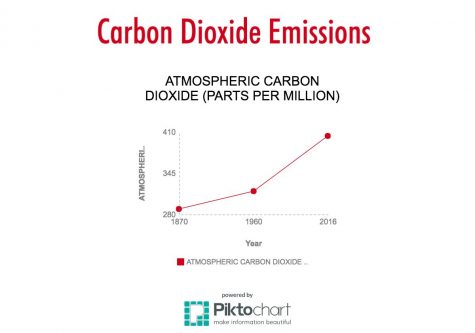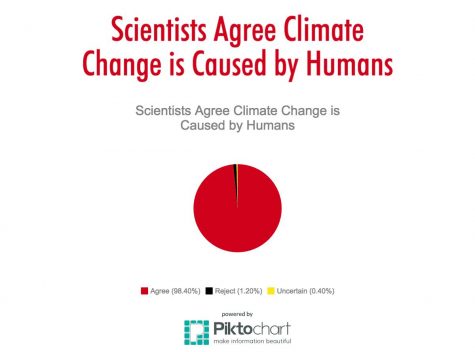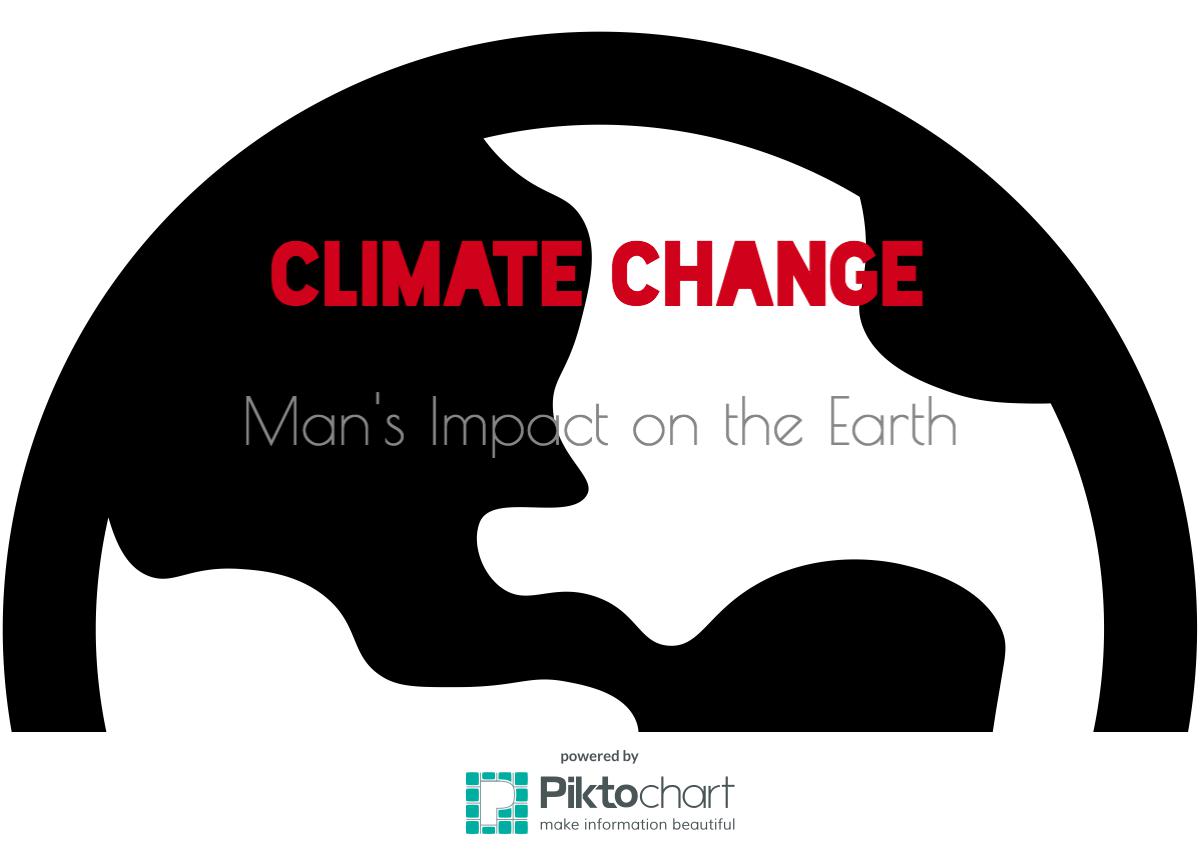Climate change: Man’s impact on the Earth
April 18, 2017
Throughout history, the human race has been known to take advantage of the environment, specifically by disregarding man’s effect on it and ignoring the emerging consequences. As a result, the long-term effects of man’s disregard are finally starting to emerge, and they do not bode well for the future.
Society riddled the Earth with poisons, reaching a peak during the Industrial Revolution. From dumping vibrant clothing dyes in rivers to releasing chemical fumes into the air, humanity used the Earth as a dumping ground for its industrial waste.
“Since the Industrial Revolution began around 1750, human activities have contributed substantially to climate change by adding CO2 and other heat-trapping gases to the atmosphere,” the Environmental Protection Agency (EPA), said. “People have increased the amount of carbon dioxide in the air by 40 percent.”

The long-term effects of man’s impact on the planet are still largely unknown, but scientists do have some idea of how these actions are affecting the planet right now. Currently, natural wonders of the world are put at risk of dying out. “We have definitely destroyed our planet,” Sadie Leszczynski, junior, said. Creating both economic and cultural impact, the changing environment is having severe effects on the rest of the world.
There is little doubt among scientists that humans are the cause of global warming, causing dramatic environmental changes. According to the EPA, “research indicates that natural causes do not explain most observed warming, especially warming since the mid-20th century. Rather, it is extremely likely that human activities have been the dominant cause of that warming.”
The main source of pollution is greenhouse gas emissions from the burning of fossil fuels.
The result of such gasses? A planet that is heating up at an unsustainable rate, leaving many species unable to adapt to the rapidly-changing climate. In fact, many species that humans depend on for sustenance, such as bees, are negatively affected by this rapid climate change.

The Great Barrier Reef, the largest coral reef in the world, is starting to die as a result of climate change. “The corals in the remote far north of the reef experienced extremely hot and still conditions this summer, and were effectively bathed in warm water for months, creating heat stress that they could no longer cope with,” Russell Reichelt, the chairman of the Great Barrier Reef Marine Park Authority, said in a statement.
Steven Miles, Queensland Australia’s environment minister, revealed that “in the north we have a very high coral death rate;” about two-thirds of the coral in the northern section is dead.
The dead of parts of the reef will have severe effects on Australia’s tourist economy, as well as on the marine life there. The animal species that currently live within the reef itself may not be able to sustain themselves on a reef with a changing structure. The species along the reef are shifting, and “we are already seeing less diversity,” Prof. Terry Hughes, the director of the ARC Center of Excellence for Coral Reef Studies at James Cook University in Townsville, Australia, said.
Closer to home, the rusty patched bumble bee has been placed on the endangered species list by the Environmental Protection Agency. This is the first bee from the continental United States to be added to the list.
Although they may not be extinct yet, the declining population of bees could greatly impact the human world. According to the Science Museum of Virginia, bees produce nine billion dollars of ecosystem services, which are defined as being “the benefits that humans gain from the natural world.”
Even if a country was to lose all that money, the most severe shortage would be felt in the food industry. Thirty-five percent of food is dependent on pollinators, including the rusty patched bumble bee. Such a sharp decrease in the amount of available food, if bees were to go extinct, would lead to worldwide famine.
As the temperature of the Earth begins to rise, it will affect all people across the world. If the current trend continues, Wisconsin “will have more extremely hot days, which may harm public health in urban areas and corn harvests in rural areas,” the EPA said. Since corn is a major economic product of the state, a reduction in the harvest would have destructive economic impacts.
Once the planet hits this point, there is very little that humans can do to reverse the effects of the damage. Therefore, it is important that people act now to reverse their actions.
To help the bees, the EPA recommends that one build solitary bee colonies in one’s garden and plant native flowers in homes and businesses for the bees to pollinate and feed from.
To help the Great Barrier Reef, citizens should push their government representatives to pass environmental-protection legislation in an effort to reduce the amount of global carbon emissions. Reducing the average global temperature requires the whole planet to act, so efforts put forth by all citizens will be effective.
The health of the environment is an issue that many people prioritize, as they see it as man’s duty to live in harmony with other species. “We are just a species on this Earth. Earth is for every living thing, so if we destroy things that are necessary for life later on we can ruin it. We have the power to save and ruin it, so why wouldn’t we save it? We are just a species that has to cooperate with others,” Mrs. Dawn Pfaff, science teacher, said.
There is no second Earth, so humanity needs to consciously commit to protecting this one.
The circular effects of this changing environment could come around to hurt future generations of people. “Humans have really abused and overused our natural resources. I think that some humans realize what the issue is but don’t take time to acknowledge the problem or fix it. If people don’t start doing something soon, this could cause a huge complication and create a negative effect in the food chain which eventually comes back around and affects our diet and health,” Leszczynski said.
